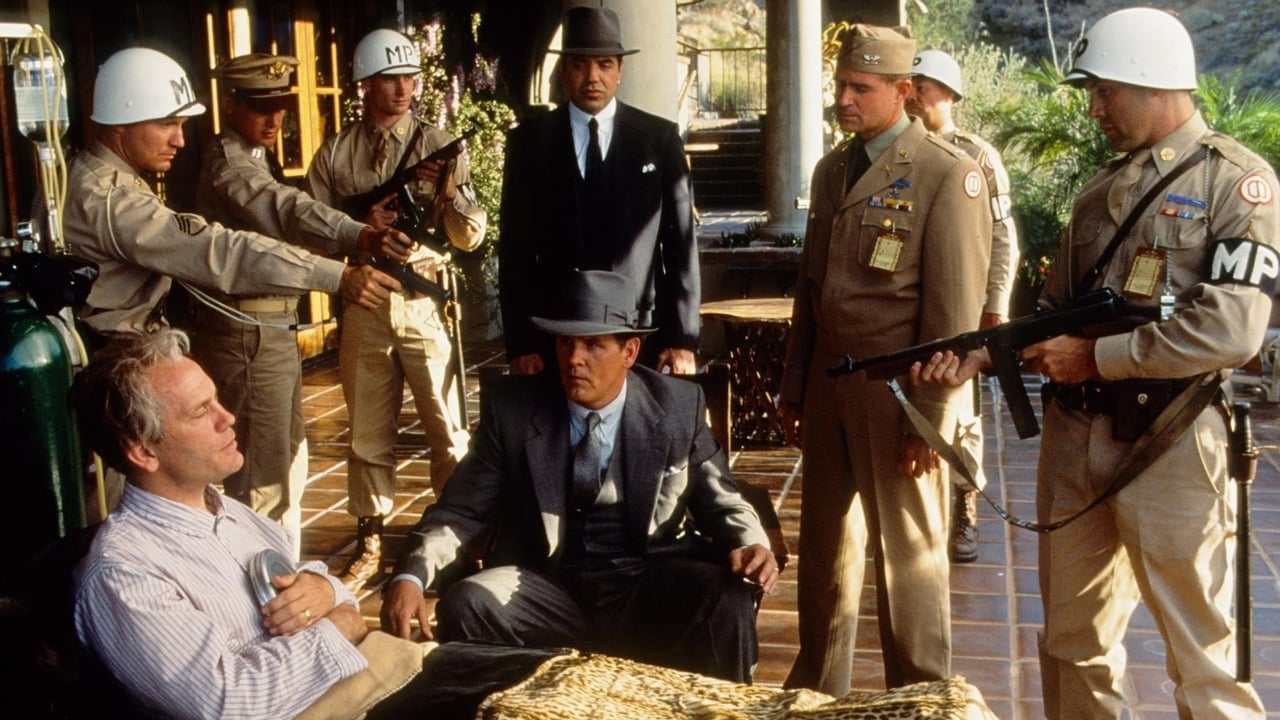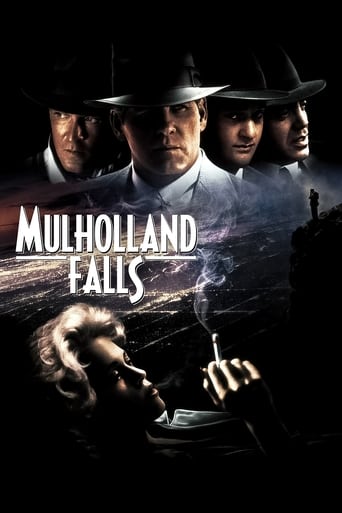

Don't listen to the negative reviews
... View MoreA bit overrated, but still an amazing film
... View MoreThe movie is wonderful and true, an act of love in all its contradictions and complexity
... View MoreOne of the film's great tricks is that, for a time, you think it will go down a rabbit hole of unrealistic glorification.
... View MoreOn the whole the movie strikes me as an unusually cynical take-down of the historically white-washed 1950's. Set in the early part of that conformist decade, the styles, costumes, and general milieu are well done. The screenplay, however, is too convoluted to provide much impact, while character development is sacrificed to plot devices. Thus the movie provides more interest than involvement.Instead of adding to the much discussed formal elements of the movie, I want to briefly outline one way of unifying the narrative's meandering and often confusing narrative. There is, I think, an underlying theme that can bring these elements together into a unifying focus. And that key theme has to do with the unquestioning popular reverence for authority that was on high during the early 1950's. After all, that was a formative period of the emerging Cold War, and established authority was taken as an unassailable line of defense. In my view, the movie casts corrosive doubt on that popular reverence, even if 50-years later.Note first how brutally the Hat Squad enforces their own version of the law. There really was a Hat Squad in the LAPD during that period, but you won't find them portrayed in Jack Webb's hugely popular and carefully sanitized Dragnet series that defined law enforcement for the 50's. Note too, how the Hats' extra-legal methods sometimes amount to murder and are tolerated not only by themselves but by police higher-ups. Now I don't know if the real Squad was that thuggish, but the movie can be taken as an iconoclastic look at Dragnet's defining version of the LAPD.Note too, how J. Edgar Hoover's supposedly incorruptible FBI is portrayed. Hoover himself is even portrayed as not above making evidence squelching deals with LAPD officials in order to protect federal higher-ups; that is, when his agents are not trashing cop Nolte's suburban home. Needless to say, this too is a long way from how the Agency was portrayed in movies and TV of the time (The FBI Story, {1959}). But here, agents are just one more gang of well-dressed thugs.And finally there's the atomic testing program on which the safety of the Free World was popularly thought to rest. In the movie, however, mutilated soldiers are shown collapsed on their collective death beds, victims of the same radiation testing. Of course, the film shows this to be the most carefully guarded authority abuse of all, since it involves a vital national priority. Recalling that time, I remember rumors of what happened to soldiers sent into the detonation field and the sicknesses that emerged as a result. Still, what was the use of such weapons unless they could also be used in battlefield conditions, instead of just wiping out cities. Thus three key institutions of both then (1950's) and now are portrayed as corrupt, at best, and murderous, at worst, their authority thereby put into question. Of course, General Timms (Malkovitch) presents what can be taken as the overarching justification for such dubious authority. It's more or less a utilitarian rationale when he states that "some must die before their time, so that others can live. It's a cornerstone of civilization." In short, some innocent folks must be sacrificed for the betterment of all. I suspect versions of this 'greater good' have salved the conscience of many a higher-up regardless of time period.Now I don't claim that the makers of MF had this debunking theme in mind when devising the film. I do, however, think it's one way of drawing together the various threads of an unwieldy narrative. As to the movie itself, it comes across as generally interesting, sometimes atmospheric, but most of all, a good advertisement for tobacco brands of the 50's.
... View MoreI saw this together with Devil in a Blue Dress for a night of surveying how noir - the first modern genre - has evolved as our modern world has. And what a world of difference they make.Both are set in the 40s and minutely try to recreate the era. Both are about women who have disappeared (here she turns up dead), a set of incriminating images and conspiracy that goes all the way up. Both derive from The Big Sleep, this one via Chinatown.But Devil felt alive, it had a measure of real desperation, urgency in the noir, a sense of place that lingered and enveloped. There was a very cogent reason for it to be set in a time of rampant discrimination against black people.This, it's not even noir, merely set in a time of noir movies. They put the same hats that people in film noir movies used to wear, the Buicks they drove, the same shiny recreation of an era as LA Confidential, but it's dead, has no pulse, and to treat noir like a period piece when it was a modern thing in its time (those were just the hats people wore) is to suck all its life away and leave us with a mannequin doll propped up on a stage.You'll know it by looking at the plot of passionate lovemaking that the head cop recalls, which is the defining moment in noir, the narrator succumbing to desire that sucks him into a devious story, captured as in Big Sleep by a hidden camera. Had he not had fallen for her, she would have been just another body when found, he would never have entered the story. But it's like a cardboard box painted like an engine, it just looks the part.No, it's simply a style that is being regurgitated here with no understanding by actors wearing noir clothes. Badly written and a TV-level of imagination to boot, as close to the noir world as a James Bond spoof is to the world of spying.Noir Meter: 1/4
... View MoreA thug cop runs up against military thugs as he investigates the mysterious murder of his former mistress.Great potential to this movie, but it's a dud. Brilliant cast, with Nolte doing his thang, and you can see him trying to spark some life into his character in the slap scene. But there's a constant sense of the actors crying out for drama and good lines. And John Malkovish looks bored as hell.The story is good, setting good, and it looks good. But the whole thing feels flat due to bad writing, directing, editing. At one point Nolte gets out of a car - after unbelievably knocking out two soldiers - lights a cigarette, and in the very next shot flips the cigarette away as he enters a doorway. Daft.There is an interesting theme in throwing people away, but not explored.Also the music is constant, hardly any silences, and all a bit gorgonzola.Basically this needed a dose of Tarantino or Lynch - either dynamic violence or weird malevolence. Thankfully we got it soon after in Reservoir, Pulp, and the other Mulholland.
... View MoreBack in 1996, an all-star cast along with odd director Lee Tamahori made a 50's noir gangster film called 'Mulholland Falls', not to be confused with 'Mulholland Drive'. This ambitious project was focused on a real life team of detectives in Los Angeles called the 'Hat Squad' who solved crimes and stopped bad guys by any means necessary, even if it meant getting their hands dirty. This was Tamahori's second feature film to direct, before he went on to make a string of mediocre to downright awful films, including the 'xXx' sequel, Nic Cage in 'Next', and 'Along Came A Spider'.However with 'Mulholland Falls', Tamahori used his detailed creative mind to get the 50s to look perfect, managing and creating each shot perfectly. Every moment of the film looks amazing, but that's about as far as it goes. While Tamahori was focusing on the visual style and framing, the story and script got away from him, which led to a movie with almost zero character development between four detectives. It's almost as we are seeing a sequel film to something we never knew existed. It would have been nice to know these four Los Angeles detectives before we see them in action, which would have us sympathize or relate to them in some form or fashion, but we don't, even though their performances are fairly good.There just isn't a lot of development with their origins or rapport, leaving us cold when something drastic happens. The leader of this detective outfit is Hoover (Nick Nolte, grunts and all), along with Hall (Michael Madsen), Relyea (Chris Penn), and Coolige (Chazz Palminteri). We meet these guys as they throw off a mob boss off a cliff on Mulholland Drive, hence the title of the film. Needless to say, this isn't the way we have come to know how police conduct their business. Soon enough though, their police chief (Bruce Dern) informs them of a dead body (Jennifer Connelly) near a construction site to investigate.The team notices that every single bone is broken in her body. From here, the detectives soon realize that this woman's death might just travel up the political ladder to the very top, as they investigate nuclear test sites and other political offices. Betrayal, sex tapes, and friendships all come to the forefront here in hopes to blackmail one another to prevent the government from looking bad, and it's up to these four detectives to figure out how this poor woman died, before they lose their own lives.With supporting performances from Rob Lowe, John Malkovich, Andrew McCarthy, Treat Williams, Daniel Baldwin and Hoover's wife (Melanie Griffith), the film moves at a quick pace, although some of the side story lines run off in a tangent. I think Tamahori couldn't focus on this huge cast, while trying to create 50's Los Angeles at the same time, and the actor's did the best they could with what they had. Some did better than others, as Melanie Griffith won the infamous Razzie Award for her performance here. It's hard not to compare the recent 'Gangster Squad' film to this, as it's very similar in nature.While it might not have that over-the-top 'Dick Tracy' feel to the movie, it borders on that same line with some overly dramatic dialogue and emotions from time to time. That, and everyone smokes cigarettes in the film from start to finish. 'Mulholland Falls' isn't a terrible film by any means, but it just isn't great either. It lacks the focus and coherence to make us fully invested, despite the awesome cast.
... View More